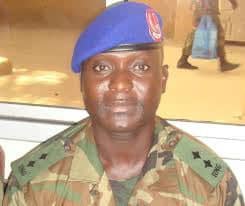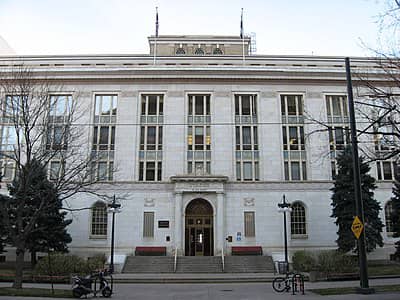Factsheet: All You Need to Know as Michael Sang Correa’s Trial Begins Next Month in the US
Come September, Michael Sang Correa, one of the most prominent members of the former Gambian president Yahya Jammeh’s special assassin team ‘jungulars’ is set to appear before the US court in Colorado.
Correa, now 45, was indicted by the US Justice Department on seven counts for his role in inflicting torture and suffering on victims, especially following the 2006 alleged coup attempt to remove Jammeh from power.
He has also been accused of having participated in the extrajudicial killings of journalists Dayda Hydara in 2004, Chief Ebrima Manneh in 2012, and the murder of Gambian-Americans Alhagie Mamut Ceesay and Ebou Jobe in 2013.

Michael Sang Correa, former member of the jungulars, a former hit squad created by ex-Gambian President Yahya Jammeh
Arrest and investigation by the U.S Authorities
Following the defeat of President Yahya Jammeh in the December 4th presidential election in 2016, Correa fled and arrived in the same month in Denver, Colorado in the United States—the US Immigration and Customs Enforcement arrested Correa in September 2019 in Colorado for overstaying his visa.
Soon after, scores of human rights organizations such as the African Network Against Extrajudicial Killings and Enforced Disappearances, the Gambia Center for Victims of Human Rights Violations, the Guernica Centre for International Justice, Human Rights Watch, the Solo Sandeng Foundation, and TRIAL International called on the United States to investigate the credible allegations of grave international crimes committed by Correa in Gambia.
Charged with 7 criminal offences for human rights abuses of 2006 alleged coup plotters
The United States attorney’s office in the District of Colorado released a press statement on June 2nd 2020, slamming Correa with one count of conspiracy to commit torture and six counts of inflicting torture on specific individuals.
According to an indictment file obtained from the US district court of Colorado, Correa was part of jungulars who participated in forcefully eliciting evidence from the alleged 2006 coup plotters. In the process, he did knowingly combine, conspire, confederate, and agree with others to commit torture specifically intended to inflict severe physical and mental pain and suffering.
Correa and his assassin team members carried out the act with the objective “to maintain, preserve, protect, and strengthen the power and authority of President Yahya Jammeh, and to intimidate, neutralize, punish, weaken, and eliminate actual and perceived opponents of Yahya Jammeh’s government, employing torture,” according to the district court.
The 7 counts are as follows: Count 1 is Conspiracy to Commit Torture. If convicted, he could face 20 years in prison, or pay a fine amounting to $250,000, or both while the remaining six counts come from a charge of torture and aiding and abetting. If convicted, he could face 20 years jail term or $250,000 fine, or both.
How Correa allegedly committed such crimes as charged
The nature of the crimes Correa and his co-conspirators have reportedly committed against 6 of the people who were accused of staging the coup in March 2006 include the following;
- Transported the accused persons from Mile 2 prison to NIA headquarters,
- Severely and repeatedly beat the accused by striking them with hands and feet, sticks, palm branches, and wires,
- extinguished cigarettes on their bodies,
- dripped molten plastic onto their thighs and feet,
- suspended victims from the ground in a rice bag to beat them while covered in the bag of rice,
- They placed a plastic bag over the heads of their victims, restricting their ability to breathe
- Placed the barrel of a pistol in their victims’ mouths and poured cold water on their bodies
- Placed heavy bags of sand on victims’ backs and stood and stomped on them.
- Brought a hot metal rod next to some of the accused.
- Hung one of the victims upside down by his legs and hit the person in that position.
- Stabbed one of the victims in the shoulder with a dagger.
- Poured molten plastic on a victim’s head and poured acid on the leg.
- Electrocuted one of the accused on his neck, back, and genitals.
- Did hit an accused person in the face with a hammer.
- Attempted to stab a victim with a bayonet.
- Extinguished cigarettes on the victim’s wrist, shoulder, and stomach.
- Did rub sand in one of the accused person’s eyes.
Trial location, venue and public access
The trial will take place in the U.S. District Court for the District of Colorado in Denver, between September 16 to 27, 2024. While criminal trials in the U.S. are typically open to the public, a judge may grant a request to restrict public access under exceptional circumstances, such as to protect the safety of a witness.

U.S District Court, District of Colorado
Why the United States?
Under the extraterritorial Torture Act, the U.S. government has the legal authority to prosecute Correa for the torture he allegedly committed outside of the U.S. because of his presence in the U.S. The act allows the U.S. to prosecute individuals found within U.S. territory, regardless of their citizenship, for torture committed outside of the country. This law operates as a form of universal jurisdiction.
It is in line with the principle of Universal Jurisdiction which allows countries to prosecute crimes committed in other countries, regardless of the nationality of the suspect or victim. Universal jurisdiction cases support efforts to hold perpetrators of atrocities accountable and to bring justice to victims.
“As federal prosecutors, our mission is to seek out injustice and to hold accountable those who perpetuate it, regardless of where it occurs,” said U.S. Attorney Jason R. Dunn. “With this arrest, we are not only holding accountable a man who has allegedly committed horrific acts of torture against his people, but demonstrating to the People of The Gambia, and indeed the entire world, that the United States stands for the rule of law and against those who abuse human rights.”
What happens during the trial?
Both the prosecution lawyers and the defence team are expected to present their arguments and submit evidence to the jury during the trial. To convince the court, the prosecution may ask witnesses to testify based on which the jury will decide concerning the guilt or otherwise. The jury must be convinced ‘beyond reasonable doubt’ that Correa had committed the crimes as charged on each count. At the end of the hearing, the conviction of Correa must be based on the unanimous conclusion of all the members of the jury. There will be a 12-person jury who must be US citizens, live in Colorado and be 18 years old and above.
Will Correa testify?
Based on U.S. laws, criminal defendants like Correa cannot be forced to testify, but they may do so if they want to. But if the defendant decides to testify, he will be subjected to cross-examination by the prosecution. The right to appeal is granted if the court finds him guilty. However, it must be based on three reasons which are: when there is misconduct during the trial, the judge made a mistake in handling his case and if the jury is engaged in misconduct or made a mistake in their verdict. But if Correa is acquitted, the prosecution cannot appeal.
Other allegations against Correa
Although these major allegations do not form part of the charges Correa is facing in the United States, there are numerous other allegations relating to extrajudicial killings involving several high-profile individuals and groups emerging from the Truth, Reconciliation, and Reparations Commission (TRRC) hearings.
Some notable cases in which he’s implicated include the murder of journalist Deyda Hydara, a prominent Gambian journalist and co-founder of The Point newspaper who was assassinated on December 16, 2004, in a drive-by shooting. His murder was a high-profile case, highlighting the dangerous environment for journalists under Jammeh’s regime. The TRRC linked his assassination to the Junglers, implicating Correa.
He is also implicated in the 2005 massacre of over 50 West African migrants orchestrated by the Junglers. Correa’s alleged role in this atrocity has been a significant focus of investigations as he’s also accused of the extra-judicial killing of 2 Gambian-Americans Alhagie Mamut Ceesay and Ebou Jobe in 2013, execution of former intelligence chief Daba Marenah and associates in April 2006, and 9 prison inmates in August 2012.
